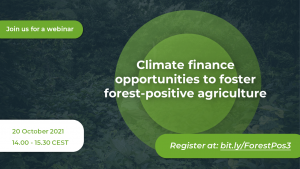Официальная обратная связь диалога для Саммита ООН по продовольственным системам 2021 года
Виды диалогов
Организатор
Язык диалога
Дата/время
Окончание
Местоположение
Формат
Просьба ознакомиться с приводимыми ниже данными для получения регистрационной информации, если таковая имеется, или обратитесь к руководителю диалога, если желаете принять участие.
Описание
The Food and Agriculture Organization of the United Nations (FAO) and the Ministry of Agriculture, Forestry and Fisheries of Japan (MAFF) are pleased to invite you to the webinar “Climate finance opportunities to foster forest-positive agriculture.” This session will be the last of three online events to be held in September and October under the common topic of “Halting deforestation: approaches and tools for forest-positive commodity value chains” (please scroll down for more information on the webinar series).
Session 2: Climate finance opportunities to foster forest-positive agriculture
Date: 20 October 2021
Time: 14:00-15:30 (Rome), 21:00 (Tokyo), 8:00 (Santiago)
Language: English, French, Spanish
Registration: https://bit.ly/ForestPos3
Session objectives:
- Provide an overview of opportunities to use climate finance, including REDD+ funding mechanisms, to develop forest-positive agriculture;
- Provide an overview of how carbon finance can incentivize private sector investment in forest-positive agriculture, conservation and restoration of forests;
- Provide an overview of advanced technical requirements to improve access to climate finance, including accounting methods, clear carbon rights and distribution of benefits;
- Share experiences and lessons learned from countries’ efforts to utilize climate finance as a catalyst for scaling ups and implement forest-positive agriculture, and demonstrate how this supports national climate ambitions and transformational change.
ABOUT THE SEMINAR SERIES:
In tropical countries, land-use conversion to agriculture and pastureland accounts for approximately 73% of deforestation. 40% of this deforestation is attributable to pressures related to the demand for and production of commercial agricultural commodities such as beef, soy, palm oil, cocoa, timber, paper/pulp and coffee. In some of the most active fronts of deforestation, land use changes coincide with the expansion of these internationally traded commodities.
Over the past two decades, attention to the impact of demand for these ‘forest risk’ commodities in driving forest loss has increased both in consumer and producer countries. Many consumer countries have begun to identify actions to mitigate the negative consequences of their consumption of these commodities through global initiatives such as environmental standards, import regulations, due diligence processes, and continuous awareness-raising. Producer countries – boosted by more than ten years of REDD+ and, more recently, by the Paris Agreement — recognize the pressing need to address agricultural production practices to reduce deforestation and carbon emissions while pursuing social inclusion and benefit-sharing.
Corrective actions to address the impact of global commodity production and trade on forests and climate change have been taken by leading private sector actors since the early 2000s. The discourse is now evolving from deforestation-free supply chains to forest positive strategies, de-risking supply chains through certification and due-diligence processes and highlighting the opportunities of sustainable supply chains and climate finance investments.
As they are responsible for up to one-third of global GHG emissions, global food systems also offer emerging opportunities to act as prominent climate mitigation action, and may boost synergies between forest positive agriculture, climate ambitions, and forest conservation.
Благодарности


